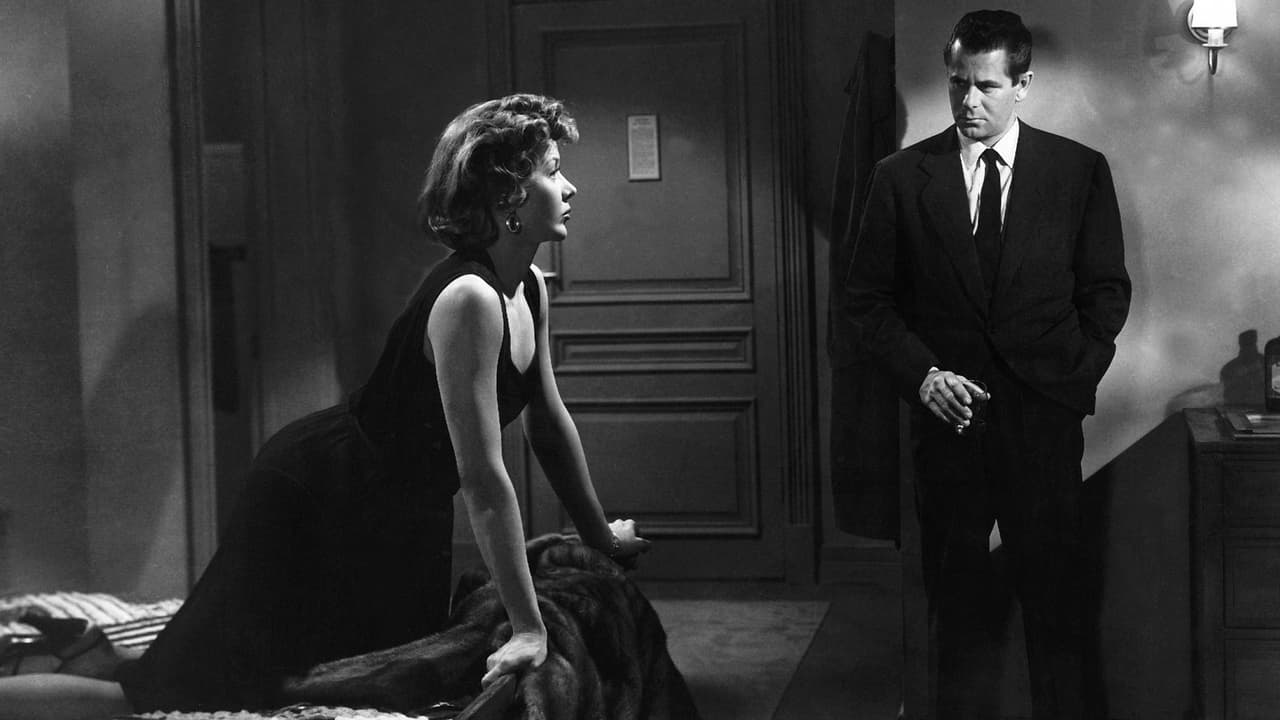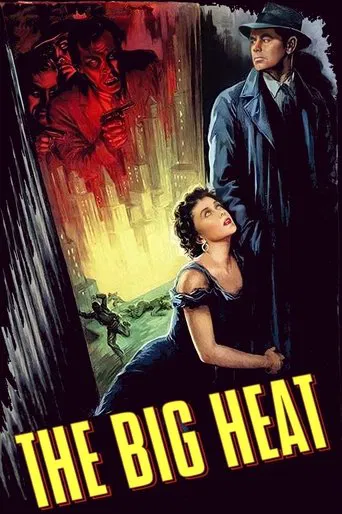

Fritz Lang was at his zenith here, sucking the viewer in to Glenn Ford's rage against the corrupt cops and politicians he works for. Ford's seething anger virtually jumps off the screen. Gloria Grahame in probably her greatest role. Each scene raises the tension level masterfully. This is what Hollywood movies are all about.
... View MoreThe book 1001 Movies You Must See Before You Die has helped me find a lot of film I probably would never have known about before, this is one of the titles I found in it, directed by Fritz Lang (Metropolis, M, Secret Beyond the Door). Basically upright cop Detective Sergeant Dave Bannion (Glenn Ford) from the homicide bureau is assigned to the case to investigate the cause of the suicide of Tom Duncan, head of the records bureau. This case seems pretty open and shut, until the police are called by Lucy Chapman (Dorothy Green), Tom's girlfriend, who says that Tom would never commit suicide, Bannion dismisses this comment, but then when Chapman is found beaten and tortured he believes there is more to the case than predicted. Despite warnings from his superior and others Bannion's trail leads him to a vicious gang he suspects holds power over the police force, he suspects many officers are on the payroll of the gangsters as they keep silence about particular things, and Bannion's assignment gets personal when a car bomb meant for him kills his wife Katie (Jocelyn Brando, Marlon's sister). Bannion is furious to get vengeance and justice, and he is aided along the way by Debby Marsh (Gloria Grahame), the spurned girlfriend of the gangster Mike Lagana (Alexander Scourby), and when push comes to shove he quits the police force to pursue the mobster and his henchman Vince Stone (Lee Marvin) on his own terms. Also starring Jeanette Nolan as Bertha Duncan, Peter Whitney as Tierney, Willis Bouchey as Lieuntant Ted Wilks, Robert Burton as Detective Gus Burke, Adam Williams as Larry Gordon and Howard Wendell as Police Commissioner Higgins. Ford is good a the crusading on and off cop pursuing the gang and all corrupt characters, Grahame as the gangster's girlfriend gets many dramatic moments, and supporting cast members like Marvin get their time too, the most memorable moments of the film is also the one the censors wanted trimmed, when Grahame is scolded in the face by hot coffee thrown by Marvin, also the car bombing moment, there are other moments that get your attention, and it is a relatively interesting story of corruption and crime, it is a worthwhile classic film noir. Good!
... View MoreClassic film-noir crime-thriller.A police detective, Sgt Dave Bannion (played by Glenn Ford) investigates the apparent suicide of a senior police officer. A woman approaches him and claims that it wasn't suicide - it was murder. Intrigue ensues...A great crime-thriller from master director Fritz Lang. While you know broadly who did it, you don't know all the details. Moreover, you mostly see it from the policeman's point-of-view, and feel his frustration as he is constrained in his abilities to crack the case.Great work from Glenn Ford in the lead role, especially as he is more known for westerns. Good support from Gloria Grahame, Alexander Scourby and an early-career Lee Marvin.Not perfect - Bannion's big break feels a bit contrived. In addition, the pacing is a bit off: after building the tension, the ending feels rushed. These are, however, minor negatives in an otherwise flawless movie.
... View MoreThe Big Heat is a prime contender for the cruelest and most brutal of all film noirs, which is saying quite a lot. At the same time, a big part of why that may be so is that The Big Heat is in many ways hardly a film noir at all. All of the great canonical film noirs, including Otto Preminger's Laura, Billy Wilder's Double Indemnity and Ace in the Hole, Jacques Tourneur's Out of the Past, and Alexander Mackendrick's The Sweet Smell of Success, tend to be populated by characters with little trace of goodness left in them; they are all doomed, fated to their inevitably bitter ends from the outset. What makes The Big Heat so powerful and disturbing—and, ultimately, so unlike most film noirs—is that it has, at its heart, many genuinely good people.Fritz Lang, the brilliant German director who had already cemented his place in cinematic history with monumental films like Metropolis, Dr. Mabuse: The Gambler, and M, creates in The Big Heat a film whose strength lies in defying expectations of plot, genre, and characterization. Its opening, for instance, is not a far cry from the usual hard-boiled detective formula. Police Sergeant Bannion (Glenn Ford) is assigned to investigate the suicide of a high-ranking fellow officer, which leads him to uncover a trail of corruption and licentiousness and, in turn, puts him into deep trouble with the local mob syndicate, headed by Mike Legana (Alex Scourby) and the psychopathic Vince Stone (a young Lee Marvin).Lang manages to transcend these cut-and-dry foundations, however, by affording his protagonist a greater depth than one usually finds in a hard-boiled detective hero. The typical hard-boiled detective is unshakeable, wisecracking and ethically-ambiguous, but generally one-note: coolness is all they have going for them. Glenn Ford's character, by contrast, is a family man and, ultimately, a tragic figure. Whereas the characters in other film noirs are often so uniformly reprehensible that any misfortunes that befall them seem almost warranted, the juxtaposition between Bannion's tough policeman persona and his fatherly sensitivity and protectiveness—first with his daughter and later with Stone's abused girlfriend Debbie (Gloria Grahame)—makes the character's plights and perils all the more involving. You see, Bannion is not just a smart-talking male power fantasy, but a decent, honest man who is merely driven to brutality by tragic circumstances.Perhaps the reason that The Big Heat seems so sadistically violent, then, is that the audience is given genuine reason to sympathize with those who are subjected to it. Again, this is where Lang's genius really comes into play. Anyone who has seen enough Hollywood movies would naturally expect that after Bannion carries his unconscious wife (played by Marlon Brando's older sister, Jocelyn Brando) off-screen after she has been wounded in a car-bombing intended for him, there would be a scene in which we see her safely recovering in a hospital bed and Bannion angrily promising her that he will find out who was responsible for the attack. But no: in the next scene, we find out that she dies. On top of that, Lang mercilessly obliterates the quaint, idyllic domesticity of the Bannion household in earlier scenes with a scene in which Bannion bitterly packs up and moves out of the old family home, now cold and empty. It's truly heartbreaking, and it makes Bannion's subsequent trials all the more compelling and, dare I say, poignant. The same goes for the infamous scene in which Lee Marvin scalds Gloria Grahame's face with a pot of boiling coffee. The scene is especially cringe-inducing and sadistic because the audience realizes that she is not just some vain, self-obsessed gangster moll (which, in a more conventional film noir, would make the cruel attack seem like poetic justice), but merely an unlucky, good-natured girl who got caught up with the wrong kind of guys.The rest of The Big Heat then works like the best of revenge tragedies, in which even more cruelty and violent retribution is enacted as form of catharsis. The one thing that struck me the most about the action in this film is just how much more forceful and yet satisfying it seemed. Just like any hard-boiled hero, Bannion goes around and punches the lights out of a lot of henchmen throughout the film. Under Lang's direction, though, the punching in The Big Heat doesn't have the stagey and almost slapstick-like physics of other cinematic punches, with the bad guys awkwardly stumbling backwards or flipping over tables. Instead, when Bannion punches somebody, they practically fly across the room, knocking everything down in their path. That Lang often quick-cuts or whips the camera around in tandem with the physical blows gives an even greater illusion of weight to the action. Furthermore, not only does Bannion punch a lot of people, but he strangles quite a few people too, including one of the female antagonists. It is here that I must give due credit to Glenn Ford for his performance here: he is not just good; he's scary good. Again, the fact that Ford is capable of showing Bannion as both a loving family man and a ruthless enforcer makes things all the more chilling.It's almost unbelievable that a film as relentless, audacious, and absorbing as Lang's The Big Heat could have been made in the context of the Hollywood studio system under the notoriously restrictive Production Code. Then again, like many of the best films from this era, maybe it's precisely *because* of the constraints of the period that the film is so effective: denied the ability to portray realistic violence or sexual content—the kind that is all but commonplace in today's films—, a filmmaker like Lang would have had to rely on the subtle power of suggestion and of well-honed characterization to generate emotional impact. That Lang was still able to make it all work so astoundingly well is surely a testament to both his and the film's undeniable greatness.
... View More